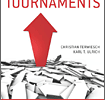
Mack Institute co-director Christian Terwiesch and core team member Karl Ulrich have published an article in the Wall Street Journal detailing their research on on ChatGPT and idea generation. Based on a recent working paper, the article details their recent research, which compared business ideas generated by ChatGPT with ideas…Read More









